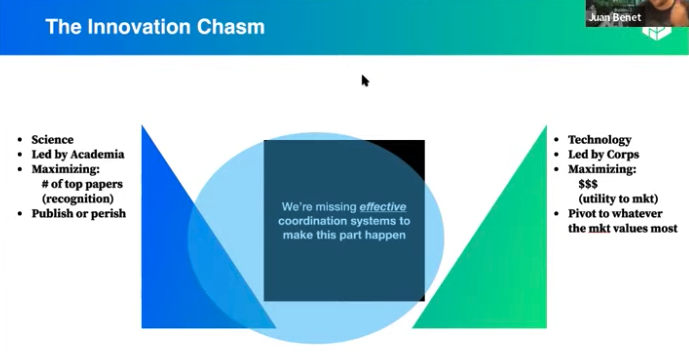Juan Benet
- Founder of FileCoin and Protocol Labs.
- Close relationship with Boris Mann, Brooklyn Zalenka, and Fission.
2022-06-25- Priorities for 2022 for Public Goods
- Critical century, decade, and year
- X-risks:
IPFS, CoinList, and the Filecoin ICO with Juan Benet and Dalton Caldwell
-
It's remarkable how much has not changed in 5 years - in a good way. The difficult problems that Juan and Protocol Labs set out to solve are still difficult problems, and they are still the ones that Protocol today is aiming to solve.
- Incentivizing decentralized storage and compute
- Designing organizations that can reliably produce Bell Labs-like returns
- "Introducing Network Funds" talk at Funding the Commons 2022 by Juan
- Experimenting with incentives for communities that yield
- Solving the "credit assignment problem"
- "if you have a set of agents that are participating in a set of endeavors, and those endeavors either create or destroy value, how do you correctly propagate reward back to the agents?"
-
Similarly surprising was the degree to which the interviewer (Dalton Banks?) just DOES NOT GET IT.
- Protocol, Juan, etc, do NOT fit the Silicon Valley playbook
- Juan is consistently thinking one level above Dalton. Dalton is asking for a specific example of a single consumer use case that will be the "killer app."
- Juan responds with: a whole new set of capabilities have been unleashed.
- The strongest single argument is about simplifying financial incentives.
- "The reason I mentioned financial instruments is because that is a fundamental innovation that both Bitcoin and Ethereum use, the ability to create financial instruments extremely cheaply without spending tens to hundreds of thousands of dollars. Instead, writing a few lines of code. You don’t have to litigate this in court. If it goes wrong, it just automatically settles in a computer. What happened with the blockchain stuff is that software began to eat finance and law in a way that had never happened before."
- The strongest single argument is about simplifying financial incentives.
- "When you take that idea, of you saying create a very strong financial incentive for people to do something around the planet, and you then couple it with building some other kind of resource-sharing network, something like file storage, you can organize this massive, massive network, as well."
- Juan responds with: a whole new set of capabilities have been unleashed.
Achieving Paretotopia with Regenerative Cryptoecon - Talk
- Juan Benet, ParetoTopia
- Eric Drexler
- Cryptoeconomics
- Critical century - exponential gains along multiple dimensions
- Eric Drexler
-
Everything around me is ruled by incentives
- Non-zero sum games
- Exponential improvements produce
- Exponential gains
- 0 to 15 exabytes on FileCoin network
- Non-zero sum games
-
Need to get better at borrowing value against the future
-
Warp the incentive field so that many more actors can
- The intention warping is Mechanism design
- Create crypto-economic structures to "bust through" local minimums
- Do this over and over again
Solving major planetary problems by:
- Trade / Assemble
Knowledge System are translating what we know into capabilities.
- Science translates what we know into capabilities.
- Missing coordination system to incentive the distribution of R&D.
Needs a more practical "next step" - working on the
2022-03-04 - Funding the Commons talk
Recap of last year's talk:
- Paretotopian
- The Innovation Chasm
- Public goods don't have a clear funding staircase
- The early part is fairly well-funded
- Later parts there's a tiny number of funders
Networked Funds
- Steps
- Mission Accomplished
- Thanks
- Credit
- Fundraising env:
- Impact Certificate
How can we use the Startup Funding Process to understand how we're going to
Reduce the complexity of the transaction through standardization of investment
Marketplace for stock units
